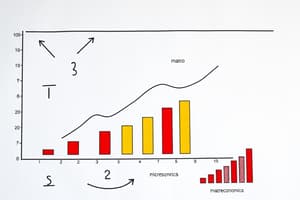Podcast
Questions and Answers
What is the primary focus of microeconomics?
What is the primary focus of microeconomics?
- National and global economic trends
- The economic behavior of individual consumers and firms (correct)
- International trade agreements
- Government fiscal policy
Which of the following is a key topic studied in microeconomics?
Which of the following is a key topic studied in microeconomics?
- Monetary policy decisions
- Global economic forecasting
- Business profits and pricing strategies (correct)
- International trade deficits
What aspect of economics does macroeconomics primarily focus on?
What aspect of economics does macroeconomics primarily focus on?
- Issues at a national or global scale (correct)
- Consumer behavior in local markets
- Regulatory frameworks for businesses
- Resource allocation in specific industries
In microeconomics, what does the study of household budgeting and consumption behaviors aim to understand?
In microeconomics, what does the study of household budgeting and consumption behaviors aim to understand?
Which area does macroeconomics focus on when examining the economy?
Which area does macroeconomics focus on when examining the economy?
What distinguishes microeconomics from macroeconomics?
What distinguishes microeconomics from macroeconomics?
How do microeconomics and macroeconomics differ?
How do microeconomics and macroeconomics differ?
Which of the following is an example of a microeconomic issue having macroeconomic implications?
Which of the following is an example of a microeconomic issue having macroeconomic implications?
How can government policies aimed at stabilizing the macroeconomy affect households and businesses?
How can government policies aimed at stabilizing the macroeconomy affect households and businesses?
What role does macroeconomics play in policymaking?
What role does macroeconomics play in policymaking?
Which statement accurately represents the relationship between microeconomics and macroeconomics?
Which statement accurately represents the relationship between microeconomics and macroeconomics?
In what way does understanding both microeconomics and macroeconomics benefit individuals?
In what way does understanding both microeconomics and macroeconomics benefit individuals?
Flashcards are hidden until you start studying
Study Notes
Economics: Exploring Microeconomics and Macroeconomics
Introduction
Economics is the study of how people, governments, and businesses manage and utilize scarce resources. The field of economics comprises two primary subfields: microeconomics and macroeconomics. Each subfield considers a distinct perspective of economic activity, and understanding both is crucial to comprehending the broader context of economic systems.
Microeconomics
Microeconomics focuses on the economic behavior of individual consumers, firms, and markets. It explores the interactions between buyers and sellers in local markets, and the decisions they make in response to market opportunities and resource limitations. Some of the key topics studied in microeconomics include:
- Household budgeting, consumption, and saving behaviors
- Business profits, costs, and pricing strategies
- The impact of laws and regulations on markets
- The allocation of resources across different industries
Understanding microeconomics can help individuals make informed choices about personal finance and consumer products, and it can guide policymakers in designing effective regulatory frameworks.
Macroeconomics
In contrast, macroeconomics examines the economy at a national or global scale, focusing on issues such as economic growth, inflation, and unemployment. Topics covered in macroeconomics include:
- National income and output
- Consumer spending, business investment, and government spending
- Interest rates and exchange rates
- Economic policies aimed at stabilizing the economy
Macroeconomics helps policymakers develop strategies for managing national or global economic systems and can inform decisions about public investments and taxation.
The Intersection of Microeconomics and Macroeconomics
While microeconomics and macroeconomics have distinct focuses, they are not entirely separate disciplines. Many microeconomic issues can have macroeconomic implications, and vice versa. For example, decisions made by individual consumers and businesses can affect overall national income and employment levels, while government policies aimed at stabilizing the macroeconomy can have direct impacts on household finances and business operations.
Conclusion
Microeconomics and macroeconomics are interrelated aspects of economics, each offering unique perspectives on economic activity. Understanding the principles and applications of both subfields enables individuals to better navigate their personal financial decisions and provides policymakers with tools to create sound economic policies.
Studying That Suits You
Use AI to generate personalized quizzes and flashcards to suit your learning preferences.




